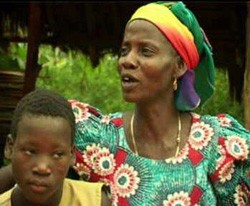
Kindjissi Houndjah recalled the day when she told her daughter Hainou she had to leave home. Kindjissi’s cousin in the city offered to take care of Hainou and send her to school. Kinjissi was sad, but relieved that Hainou would be well fed and go to school. In Benin, this is not uncommon: poor, rural families often send daughters into homes of a wealthier urban family.
But Hainou never went to school. Instead, she had no choice but to stay home to help with housework. When members of the local Association of Students’ Mothers noticed that Hainou was no longer at home, they approached Kindjissi to find out what happened. They explained to her why it was important that all of her children be able to attend school. With the financial help and moral support of the association, Kindjissi was able to bring Hainou home, where she is now a primary school student.
Supporting the mothers’ associations is part of a USAID strategy to increase women’s involvement in school management and promote girls’ education. This practice of sending daughters away, a major problem in southern Benin, is just one of the reasons for the gap between girls’ and boys’ enrollment in primary school. Other reasons include trafficking and early marriage. The associations sensitize families on the importance of educating all children, and when mothers notice that a child is absent for a long time, they mobilize to convince the parents to bring him or her back home and into school. The mothers even raise funds to help pay for the child’s return.
The traditional school parent associations — which in Benin are often dominated by men — welcome the efforts of the mothers’ associations, especially as regards enrollment of girls. “The mothers are the ones who are on the scene and able to convince girls to return to school,” said Louis Enni Tinguougoui, president of a parents’ association in Aplahoué. The mothers’ associations also initiate income generating activities to pay for school improvements, community teachers, and student lunches, among others. The success of USAID’s approach has been widely recognized. Other donors, organizations, and even the Ministry of Primary and Secondary Education are developing similar initiatives with the goal of increasing the number of girls like Hainou who attend and complete primary school.







Comment
Make a general inquiry or suggest an improvement.